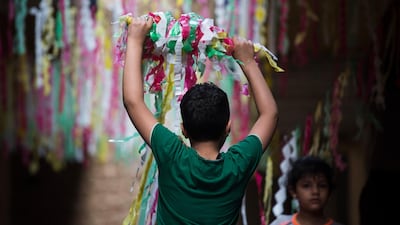Egyptians on Monday sacrificed their outdoor celebrations to mark the country’s oldest holiday, Sham El Naseem – or "smelling the breeze" – to stay home and prevent the coronavirus from spreading further.
It was the first time in living memory that Egyptians, who now number 100 million, have intentionally passed on their customary picnics in parks or by the banks of the Nile.
Instead, they made do with family gatherings over a traditional lunch of fish or meat, and boiled eggs coloured by children.
Sham El Naseem is meant to mark the arrival of spring. With roots in Pharaonic times, it is a non-religious feast marked by the Muslim majority and Christian minority of about 10 million people.
To try to contain the spread of the coronavirus, authorities closed public parks and banned travel between the country’s 27 provinces in tour buses for the day.
All modes of public transport were also suspended.
Authorities had already closed beaches, historical sites and museums as part of anti-coronavirus measures.
They also include a night-time curfew, a ban on gatherings and international air travel, and closure of mosques, churches, schools and universities.
A large police force was posted across Cairo on Monday to ensure the city’s about 20 million residents refrained from gathering in public spaces.
Nile-side streets were barricaded to deny access to pavements running parallel to the river.
The city looked deserted for most of the day but traffic picked up in the evening when many streets appeared dimly lit.
Only supermarkets, pharmacies and bakeries remained open on Monday.
But Sham El Naseem had the highest one-day number of coronavirus infections since the first case was diagnosed in mid-February.
The Health Ministry said 189 cases of Covid-19 were discovered, one more than the previous high recorded on Saturday.
The latest figure takes the number of confirmed Covid-19 cases in Egypt to 3,333.
The ministry said 11 people died of the virus over the past 24 hours, taking the death toll to 250.
Authorities have assured Egyptians that the number of infections and fatalities remained within forecasts made in the early stages of the pandemic.
But they have warned that the outbreak could spiral out of control if people did not adhere to social-distancing.
The government has launched a vigorous media campaign to urge people to stay home and observe higher hygienic standards.
It hoped to avoid infection while trying to strike a balance between protecting people against the virus and preventing an economic meltdown.




















